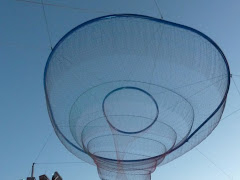deja vu
One of the precious few ways to offend your Canadian friends is to suggest that their country is a paler and colder version of its southern neighbor. And there are indeed many ways in which Canadians are different. Food seems to be more edible here and cities actually resemble places to live in and not abandoned movie sets. But in some cases Canadians are just dead set on repeating American mistakes. The ever present foreclosure signs and empty subdivisions disappear when you cross the border. Instead props that we begin to forget show up: real estate agents are shamelessly peddling their trade on every inch of promotional space, houses are getting bought, demolished and reconstructed apparently overtime, your bartender is giving you free buy vs. rent advice with a pint of local brew.
underwater

This is not yet another post about scuba diving. Phoenix, Arizona is underwater. There was no flood here. The whole thing is strictly metaphorical: nearly 70% of all homeowners with mortgages owe more than their houses are currently worth. Prices dropped to half of what they were at the peak. That’s why people feel they are drowning. This is of course just an illusion. It’s impossible to drown in a mirage on the desert and - even more importantly - the situation is not as dire as the numbers alone tell us. The fact that many people assume they have no choice but continue paying off their debt, doesn’t magically make their wildly optimistic home evaluation more real.
hub

This city used to be modestly called the hub. As in: the hub of the universe. Well, not the entire universe: just the solar system. Hence modesty. For quite a long time Boston did not have to prove anything to anybody. Not even to those new fangled New Yorkers. By the time we moved into the area though, it did not look like much. It had history on its side: American independence war started here and the city itself was founded in 1630 which is why everyone was telling us it’s old. But we moved from Gdańsk, which was just celebrating its millenium, so less then 400 years did not impress us. Dirty, messy and unreasonably cold: this is pretty much how we felt about it.
detroit
There was no war here. Nor a natural disaster. The lake did not flood the town as it did in New Orleans. The German army did not march in methodically burning houses like in Warsaw. No bombs were dropped. But you’d be excused to think something terrible must have happened. The place looks like the infamous lower 9th ward in the aftermath of Katrina. Houses are left deserted, boarded or burned. Furniture is rotting on a sidewalk. Roads are beyond repair. Abandoned cars are parked on driveways leading to nowhere. It’s not quite a ghost town: manicured lawns neighbor weed-overgrown ruins. A few residents appear out of nowhere and one starts waving in our direction. In all other places in US we would approach him and start conversation. Here we turn and speed away. If America has a failed city this is it. No wonder journalists flock here to shoot photos of ruin porn much to the annoyance of locals.
real estate
Telluride, Colorado is a playground for the rich. Not as famous or expensive as Aspen but multi-million dollars condos beg to differ. You don’t notice it at first in the summer when gondola runs for free but $1950 for a season ski pass speaks for itself. It’s a pretty little town nested in a valley surrounded by dramatic mountains. Full of fancy hotels, boutique shops and decent restaurants. Completely devoid of chain stores or motels. It seems once the rich move into town they keep walmarts and mcdonalds out. Too bad they also keep house prices high.
revival
Chattanooga is a cool city. Too bad we can never go back. The city was allegedly the dirtiest in America in the seventies, but it cleaned up nicely. There is a new waterfront complete with two wading fountains, pedestrian bridge, art district peppered with outdoor sculptures. They also have mountain park overlooking the city and many other attractions, which we didn’t have time to sample, like underground waterfalls in a cavern, inclined railway and mountain bike path.
oil
We slowly travel west towards Pensacola looking for signs of oil. Every orange boom on the water, every bit of dirt in the sand make us think it’s there. But beaches are clean as far as Panama City and the increasing number of for sale signs and foreclosures belongs to another man made disaster: collapse of the real estate bubble. We check out every beach afraid it may be the last oil-free one. At the local restaurants we are told to enjoy our oysters while they last. It’s like everyone is aware of some biblical disaster looming around the corner. We do find something on Miramar Beach. There is a notice that the beach has been affected by the Deepwater Horizon oil spill and swimming may be hazardous to your health. Nobody pays any attention to that. No tar balls or oil sheen in sight. As everywhere else parents let small children bathe, teenagers try paddle boards, retirees sit on half-submerged beach chairs.
lost
Not sure how it happened, but we are suddenly lost. We are supposedly in Picayune Strand State Forest. We arrived here driving a scenic county road that was described in one of the state park guides. We could always retrace our steps but it’s getting dark and 15 miles of the narrow dirt road that led us here does not look appealing. Not to mention the fact that it would put us back in the middle of nowhere and we are getting rather hungry.